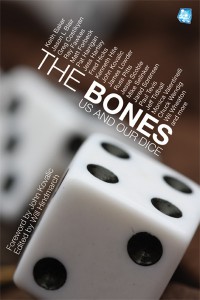I don’t know about you, but lately I feel like I’ve been a little scattered. There’s always something shiny and new online, and there’s no better way to see, hear and share those new and shiny things than through Facebook and Twitter. That’s when I realized: I’m checking Facebook and Twitter before I open up my e-mail. I’m not reading through a website anymore, I’m scanning a headline or a link and making snap judgments. When the political unrest happened here, I spent more time on these interfaces, too. When I had a new release? Same story. I’ve been glued to my computer screen watching reader reactions to Paths of Storytelling for Vampire: the Masquerade.
 Lately, I feel I’ve been getting news poisoning more easily and I’ve been moodier than usual. (Incidentally, news poisoning is my definition for what happens when people’s moods shift from upbeat to negative after hearing so much bad news.) I hear about all the things going wrong with the world — earthquakes, floods, rebellions, etc. — and I wonder what I (or anyone else, for that matter) can do. It’s overwhelming.
Lately, I feel I’ve been getting news poisoning more easily and I’ve been moodier than usual. (Incidentally, news poisoning is my definition for what happens when people’s moods shift from upbeat to negative after hearing so much bad news.) I hear about all the things going wrong with the world — earthquakes, floods, rebellions, etc. — and I wonder what I (or anyone else, for that matter) can do. It’s overwhelming.
Add any positive news, book releases, business offers, or whatever else on top of that and I head straight into information overload. Now, it’s not: “Hey, social media is this fun thing that allows me to share news and connect with people.” It feels like either I’m connected or I miss out. If I log-in just one day late, I’m obviously not paying attention.
The analyst in me also recognizes that social media, especially when coupled with web analytics, has a built-in reward system. I see instant feedback: traffic, likes, comments, RTs, shares. I see instant validation. But to what end? Well, that’s what I want to find out.
So, I decided to try an experiment that was limited in its scope and manageable on my end. Here’s what I’ve come up with:
Rules for the 100 Days Experiment
Go Dark on Social and IM – No Twitter, no Facebook, no GTalk or Skype unless used for business purposes. My blog and FlamesRising.com automatically feed to my Twitter account, so for all intents and purposes my account will remain active. Same thing with Facebook. I recently bit the bullet and created a Monica Valentinelli on Facebook author page that’s public and assigned an Admin. So, people can still follow my work without me having to log in and approve them as my FB friends.
Avoid Analytics for Personal Use – Web traffic, sales data, etc. can be its own distraction because it is, in a sense, validation for my efforts. For this 100 days? I don’t want to know how many followers I have, where my work ranks on the various sales lists or how many friends on Facebook are commenting. I am not going to watch what happens to my blog, newsletter or RSS feed traffic either. I’m simply going to shut off the “rewards” until all this is over.
Focus on Creation and Maintenance, not Consumption – If I want to be an author and sell books, then I need to put most of my efforts into the content creation, rather than the consumption, category. As a creator, I already don’t watch a lot of television. For this jaunt, though, I’m going to limit visual media (video games, movies, TV); I won’t have it on while I’m working and will only use it when I’m taking a break. I’ll probably explore this further in an upcoming post. I’m also going to put more work into my blog. Part of my reasoning behind this is explained below; the other part is that I own this website. I don’t “own” Twitter or Facebook which, for a writer, is dangerous.
Utilize my Blog for Accountability – One of the things that’s worked for me in the past, is to have a mini-goal that serves the purpose of accountability. Did I create that day? If I force myself to report my creative activities and personal goals, then I’m going to accomplish them because someone on the other end of the line will hold me to it. In my experiences, the best way to achieve this would be to blog more frequently than I have been. After going back-and-forth, comments will be open and moderated. If you want to, you will be able to read about my observations. It won’t all be serious, I’m sure.
These Rules are for Personal Use – If a widget is broken and I need to test it? If a company throws millions of dollars at me and I need to engage? If a gaming company or publisher asks me to do a scheduled chat? The idea of a hundred days is for my personal, rather than professional, use. Otherwise it will hinder–rather than free–me. Can’t have that happen.
Rely on E-mail to Communicate – Often, people will talk to me about a review on Twitter or ask me for a favor on Facebook. While I’m happy to oblige and help out where I can, because we’re all just slogs here, I feel this is also contributing to my information overload. To be clear: it’s not that I feel anyone is doing anything wrong, this may be part of my desire to be connected and never take a break.
E-mail is more manageable for me because of the way that I organize it. So, for this 100 days I’m opting to use that as my primary form of internet communication again.
What’s freaking me out a little, is that on the internet? A hundred days is a long, long time. If seven years on the internet take place for every one year in real life, then this experience will be the equivalent of two and a half online years of reduced interaction. I have absolutely no idea what, if any, effect this will have on my online reputation or presence. I’m a little worried that I’m going to fall back into obscurity, since I’ve made several new personal and professional connections through social media, but the only way to know for sure is to experiment. So, I guess the appropriate thing to say is… Wish me luck!
The 100 days begins on Monday, April 4th, 2011 and ends on Wednesday, July 13th, 2011.


 Yesterday, I was replying to
Yesterday, I was replying to  So what do you do when you feel bitterness seeping into your bones? You write more, dammit. No seriously. You drop what you’re doing and you work your ass off. You’re never going to get anywhere unless you put your fingers on your keyboard and write another story. Then you submit it. Then you work on the next one. And so on.
So what do you do when you feel bitterness seeping into your bones? You write more, dammit. No seriously. You drop what you’re doing and you work your ass off. You’re never going to get anywhere unless you put your fingers on your keyboard and write another story. Then you submit it. Then you work on the next one. And so on.